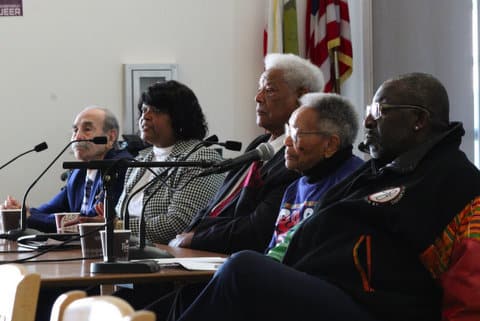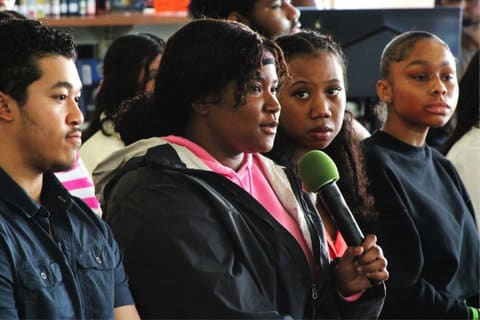
08 Mar ‘Living History’: Tony Thurmond Brings Black Richmond Leaders to DeAnza High

John Marquez, from left, Audrey Miles, Nathaniel Bates, Myrtle Braxton and Ahmad Anderson — who have all served the Richmond public in different ways — spoke to West Contra Costa students for Black History Month.
Story and photos by Joe Porrello
California State Superintendent of Public Instruction Tony Thurmond hosted an oral history panel featuring Black elected and public officials Feb. 28 at De Anza High School.
These community leaders spoke to roughly 50 students about their adversity and triumphs. Additional students throughout the district attended virtually.
“I’m a believer that the best history is living history,” said Thurmond. “They’re incredible leaders who have watched this city and how it has grown and evolved. They can share with you from a first-person narrative, the history we read about — many of them experienced it and helped to shape it.”
Myrtle Braxton, 97, said she was the only person from Richmond to serve on the National Parks and Recreation Committee and the first female Black president of a national citizens branch of the National Parks Association.
“Everybody thought I was going to fail as the first Black woman… but I wasn’t the last because I worked hard and succeeded in what I was supposed to do,” she said. “Sometimes, people will tell you that you can’t do something. Then, it’s up to you to prove them wrong.”
Braxton says the accomplishments of Black people should be more prevalent and celebrated at schools.
“I think that Black history should be part of the curriculum,” she said.
Sharing Braxton’s cultural pride was her neighbor Irma Anderson, the first Black female mayor of Richmond and first Black female mayor elected in a California city of 100,000 people or more.
Video was shown of an interview Anderson gave not long before she died in late January of pancreatic cancer.
“The community knew me… I provided services that they needed in a way that was acceptable,” she said in the segment.
Her son Ahmad — a former Richmond NAACP Executive Committee member and the only person from Richmond in the Cal Athletics Hall of Fame — was on the panel.
Anderson, who ran for City Council in 2020, said that holding some council meetings at high schools during school hours could get youth more involved.
“We’re asking students who go to school all day to then come later down to City Hall,” he told the Pulse. “I think events like this are important; you’ve got to meet people where they are.”
Anderson said its relatively low financial resources should not keep the WCCUSD or its students from thriving.
“We may lack money here in the district, but we don’t lack knowledge, experience and know-how,” he said.
>>>Read: Teacher and Her Students Agree: Layoffs Not the Answer to WCCUSD Budget Woes
Anderson’s late father also played a pivotal role in the community, illustrated by parks and community centers in Richmond bearing his name. The Rev. Booker T. Anderson first became mayor in 1969 and was president of the Richmond Port Authority and Housing Authority.
Anderson’s parents are the only husband and wife to both serve as Richmond’s mayor.
After graduating from San Francisco State University, the elder Anderson earned his master’s degree at Boston University, where he developed a kinship with Dr. Martin Luther King Jr.
“There were many nights my father wasn’t with me because he was on the road to Birmingham, he was in Detroit after the fire, he was in Selma,” Anderson told the Pulse, noting that his father’s work with King taught him the importance of sacrifice for the greater good.
Anderson’s father also had a friendship with panelist Nathaniel “Nat” Bates, who in the last 60 years served Richmond as an eight-term council member and was at one point the oldest elected official in the nation at age 91 before leaving office last year. Bates was mayor for two stints in the 1970s and ran again in 2022 to replace Tom Butt.
Bates’ roots in Richmond run deep. He worked on the shipyards during WWII after moving to the Bay Area from the South.
And his legacy stretches beyond the local area, as he is in the Canadian Saskatchewan Baseball Hall of Fame for his time pitching with one of the first professional all-Black teams north of the border in the 1950s.
His career included associations with 11 U.S. presidents, from Lyndon Johnson to Barack Obama, who invited Bates to the White House for a Christmas celebration.
Bates’ said he was inspired by his single mother who raised him, and an Irish baseball coach whom he referred to as a surrogate father.
“I surrounded myself with people who had my welfare at the top of their agenda,” he said.
He says young people must be inclined to take guidance from all types of individuals, regardless of their background.
“A lot of people are willing to assist you, so open your hearts,” he said. “I learned as an athlete to be open-minded, which is very important in this day and age if you want to be successful.”
Bates said events like this can help provide future success for students through education on the past.
“If you don’t know your history, it’s difficult to move ahead,” he told the Pulse. “It’s important they understand the troubles and the tribulations their parents and grandparents endured.”
- About 50 De Anza High students saw a panel of speakers at their school who have are a part of Richmond history, while other district students listened remotely.
Audrey Miles, an educator of almost 30 years and the first Black woman elected president of the WCCUSD board, also referenced the power of knowledge.
“In order to have your voice heard, be informed,” she said.
Miles highlighted a local youth parks and recreation project that had to be shut down due to a lack of participants as a sign of what needs to change.
“If you don’t pay attention to your neighborhood, nobody else is going to either,” she said. “As a young person, this is your community, this is going to be left to you, so it’s up to you to make sure it’s a viable place to inherit.”
Growing up in San Francisco and migrating across the Bay after being priced out, Miles said the best part about Richmond was the sense of community and Black pride she felt, pointing to the local work of Dr. William Jenkins, churches, and burgeoning Black-owned businesses.
“No matter if you were a transplant or whatever, you were made to feel welcome,” she said.
‘The Richmond I Love Is as Misunderstood as a Rebellious Teenager’
The city also has a strong Latinx community, and former Contra Costa College board member John Marquez played an integral role in its political representation. He served 18 years on the Richmond City Council after being the first Latino elected.
Before that, he served his country.
Coming from the Bay Area, Marquez said his first experience with segregation came in the 1950s when he was stationed in North Carolina — where bathrooms and restaurants were racially divided. As a Latino, he said he didn’t know where he was and wasn’t allowed.
As an Army paratrooper, Marquez jumped out of airplanes “with nothing but a parachute in the back, a reserve parachute in the front… and a great belief in the Almighty,” he said.
At 78, he was jumping out of an airplane again — to celebrate his birthday.
“It was like the old days, except it was a little more scary now,” he said.
Being proactive and believing in themselves like he has are key for students, according to Marquez. He said he took initiative and that his bilingual abilities and educational accomplishments made him sought after by employers.
Multiple speakers, including Marquez, acknowledged the world has changed, making the academic and professional realms different to navigate from when they were young. They spoke about artificial intelligence taking potential jobs. The group agreed that many young people cannot afford traditional college, but it is not the only option.
“You can go to our community colleges here; there are opportunities for you there,” said Anderson.
- One De Anza High student asks the panelists a question to conclude the Black History Month event.
Bates says that students should not become fixated on any career choice because of the current transitional state of the working world.
“This new technology is a new monster, and if you’re not ready and prepared to deal with and move into those areas in the immediate future, you’re going to get left behind.”
Anderson pointed to the Labor Board and Community College Board making appearances at schools as something that could potentially translate into a significant positive impact. The students themselves must also seek change, he says, regardless of their specific circumstance.
“No matter how dark the night, there is a morning; wake up — embrace it,” Anderson said. He used the untimely school bells ringing throughout the panel as an analogy for life: “Just like the noises we’ve had — stay focused, don’t be distracted; keep your eyes in front but understand you use your rearview mirror to manage the road of life.”








No Comments